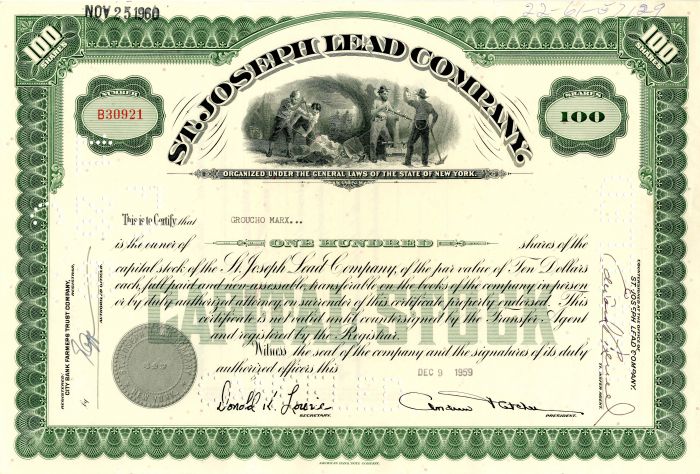St. Joseph Lead Co. Issued to Groucho Marx - Stock Certificate
Inv# AG1762 Stock
Stock issued to but not signed by "Groucho Marx". Rare!

Julius Henry (Groucho) Marx (1890-1977) Julius Henry "Groucho" Marx (October 2, 1890 – August 19, 1977) was an American comedian and film and television star. He was known as a master of quick wit and widely considered one of the best comedians of the modern era. His rapid-fire, often impromptu delivery of innuendo-laden patter earned him many admirers and imitators. His distinctive appearance, carried over from his days in vaudeville, included quirks such as an exaggerated stooped posture, glasses, cigar, and a thick greasepaint mustache and eyebrows. These exaggerated features resulted in the creation of one of the world's most ubiquitous and recognizable novelty disguises, known as "Groucho glasses": a one-piece mask consisting of horn-rimmed glasses, large plastic nose, bushy eyebrows and mustache. Marx stated that he was born in a room above a butcher's shop on 78th Street in New York City. The Marx children grew up on East 93rd Street off Lexington Avenue in a neighborhood now known as Carnegie Hill on the Upper East Side of the borough of Manhattan, in New York City. Marx's family was Jewish. Groucho's mother was Miene "Minnie" Schoenberg, whose family came from Dornum in northern Germany when she was 16 years old. His father was Simon "Sam" Marx, who changed his name from Marrix, and was called "Frenchie" throughout his life because he and his family came from France. After a few stabs at entry-level office work and jobs suitable for adolescents, Julius took to the stage as a boy singer in 1905. Marx reputedly claimed that he was "hopelessly average" as a vaudevillian, but this was typically Marx, wisecracking in his true form. By 1909 Minnie Marx had assembled her sons into a forgettable-quality vaudeville singing group billed as "The Four Nightingales". The brothers Julius, Milton (Gummo Marx) and Arthur (originally Adolph, from 1911 Harpo Marx) and another boy singer, Lou Levy, traveled the U.S. vaudeville circuits to little fanfare. After exhausting their prospects in the East the family moved to La Grange, Illinois, to play the Midwest. After a particularly dispiriting performance in Nacogdoches, Texas, Julius, Milton, and Arthur began cracking jokes onstage for their own amusement. Much to their surprise, the audience liked them better as comedians than as singers. They modified the then-popular Gus Edwards comedy skit "School Days" and renamed it "Fun In Hi Skule". The Marx Brothers would perform variations on this routine for the next seven years. For a time in vaudeville all the brothers performed using ethnic accents. Leonard, the oldest, developed the Italian accent he used as Chico Marx to convince some roving bullies that he was Italian, not Jewish. Arthur, the next oldest, donned a curly red wig and became "Patsy Brannigan", a stereotypical Irish character. His discomfort speaking on stage led to his uncle Al Shean's suggestion that he stop speaking altogether and play the role in mime. Julius Marx's character from "Fun In Hi Skule" was an ethnic German, so Julius played him with a German accent. After the sinking of the RMS Lusitania in 1915, public anti-German sentiment was widespread, and Marx's German character was booed, so he quickly dropped the accent and developed the fast-talking wise-guy character that became his trademark. The Marx Brothers became the biggest comedic stars of the Palace Theatre in New York City, which billed itself as the "Valhalla of Vaudeville". Brother Chico's deal-making skills resulted in three hit plays on Broadway. No comedy routine had ever so infected the Broadway circuit. All of this predated their Hollywood career. By the time the Marxes made their first movie, they were major stars with sharply honed skills, and when Groucho was relaunched to stardom on You Bet Your Life, he had already been performing successfully for half a century. Groucho Marx made 26 movies, 13 of them with his brothers Chico and Harpo.
A stock certificate is issued by businesses, usually companies. A stock is part of the permanent finance of a business. Normally, they are never repaid, and the investor can recover his/her money only by selling to another investor. Most stocks, or also called shares, earn dividends, at the business's discretion, depending on how well it has traded. A stockholder or shareholder is a part-owner of the business that issued the stock certificates.









Ebay ID: labarre_galleries